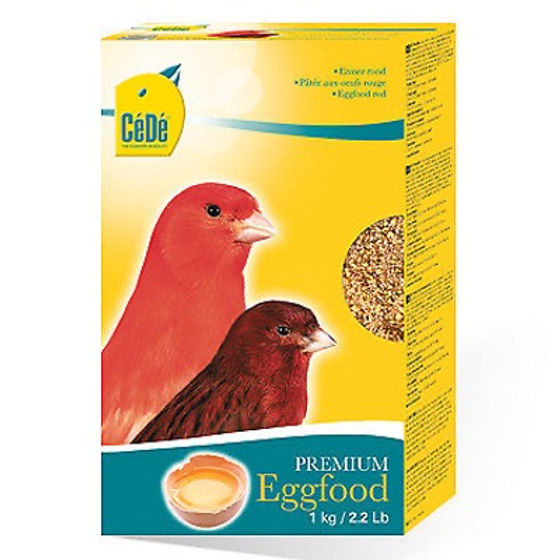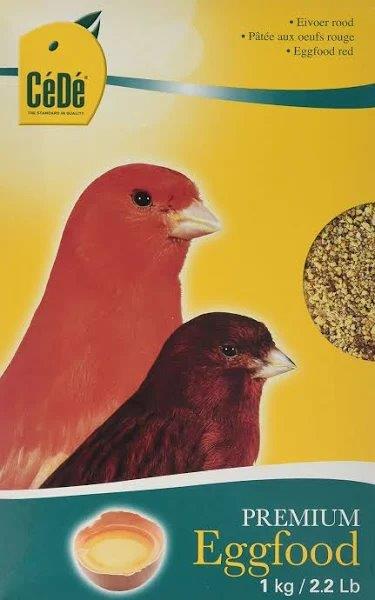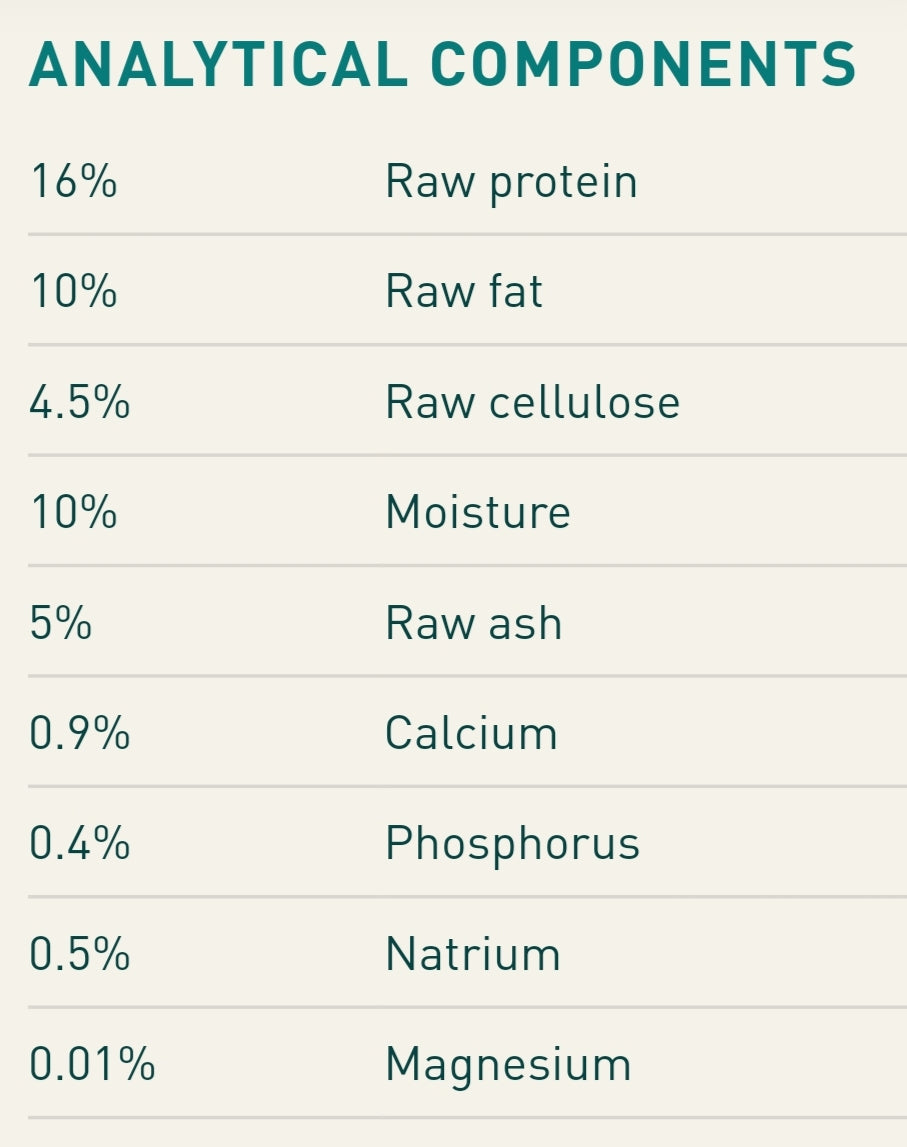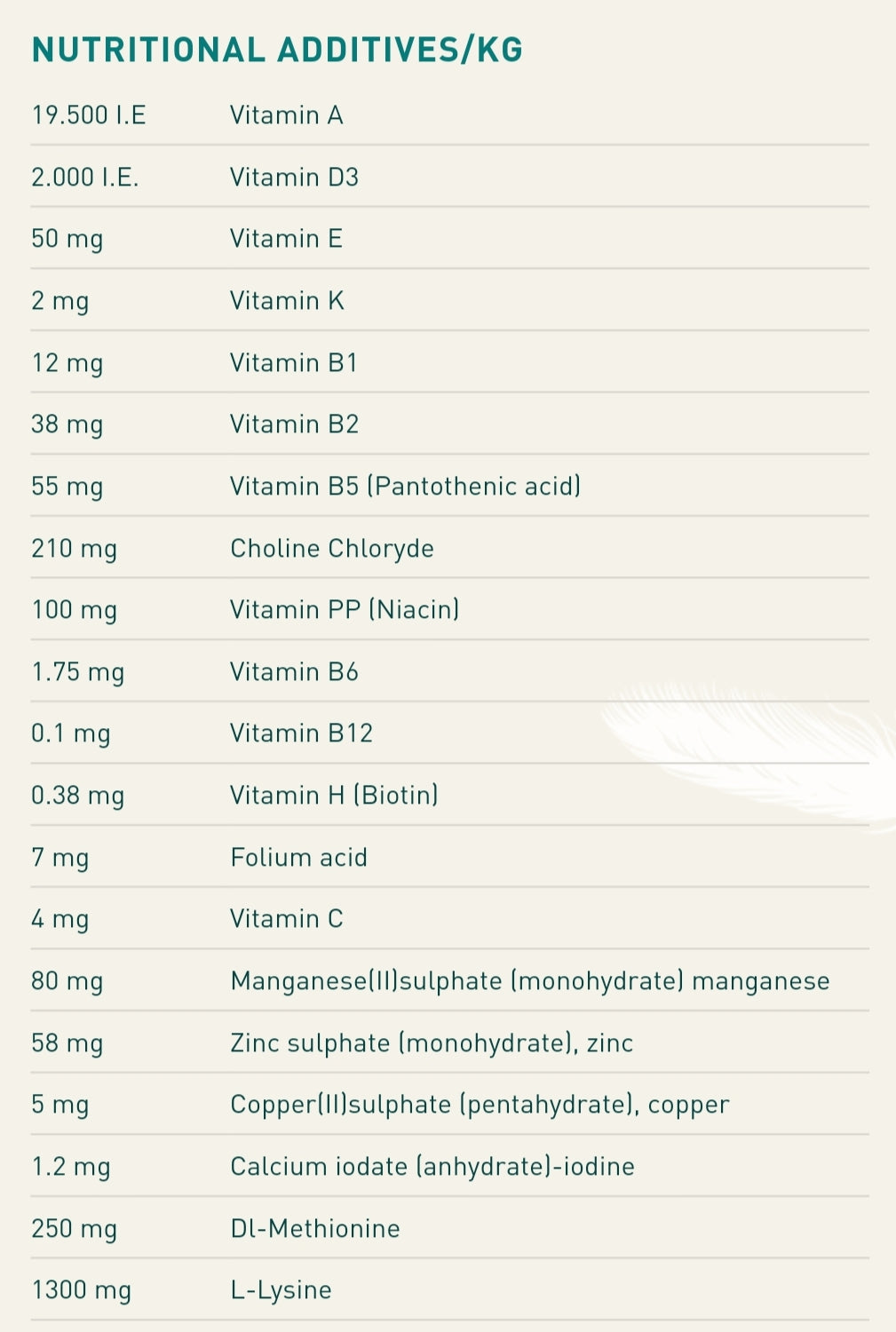- Brand: CeDe
- Sku: HL-CEDE-RED
CeDe | Young Rearing Bird Food | Premium Red Canary Eggfood - 1kg
CeDe Red Canary Egg Food: Optimal Nutrition and Colour Support for Thriving Canaries
Give your canaries the nutritional edge they deserve with CeDe Red Canary Egg Food, a premium complementary feed supplement designed to support their vitality and help maintain their beautiful red plumage through all life stages. Providing a highly digestible and valuable source of animal protein, CeDe Red is the ideal choice for red-factor, coloured, type, and singing canaries, offering an essential boost during periods of rest, breeding, and moulting.
This meticulously formulated egg food contains all the necessary vitamins, minerals, amino acids, and trace elements crucial for successful reproduction and maintaining optimal vitality. Importantly, it includes \beta-carotene (Beta-Carotene), a vital pigment that helps maintain your red canaries' vibrant colouration. CeDe Red is perfect for birds with high nutritional demands, such as rapidly growing young chicks during the breeding season, and serves as an excellent tonic or pick-me-up at any time your canary needs an extra boost.
For Canaries Seeking Intense Red Colour:
While CeDe Red Canary Egg Food contains \beta-carotene for colour maintenance, achieving a truly intense red plumage may require the addition of a specific red factor supplement, such as CeDe's Carored, during breeding and moulting periods. This allows you to tailor the colour intensity to your specific needs, whether for general vibrance or show-quality brilliance.
Ensure your feathered friends receive the complete nutrition they need to flourish and showcase their stunning red hues with CeDe Red Canary Egg Food.
Ingredients: Bakery products, Eggs and egg derivatives (e.g., 31.4% eggs* *rehydrated), Vegetable protein extracts, Cereals, Various sugars, Seeds, Oils and fats, Minerals, Derivatives of vegetable origin, Contains \beta-carotene for colour maintenance.
Analysis (Typical values, may vary slightly):
Crude Protein: 16%, Crude Fat: 9.5%, Crude Fibre: 2.2%, Crude Ash: 4.8%, Calcium: 0.9%, Phosphorus: 0.4%, Sodium: 0.5%, Magnesium: 0.01%.
Nutritional Additives per kg (Typical, can include):
Vitamin A: 19.500 I.E., Vitamin D3: 2.000 I.E., Vitamin E: 50 mg, Vitamin K: 2 mg, Vitamin B1: 12 mg, Vitamin B2: 38 mg, Vitamin B5 (Pantothenic acid): 55 mg, Choline Chloride: 210 mg, Vitamin PP (Niacin): 100 mg, Vitamin B6: 1.75 mg, Vitamin B12: 0.1 mg, Vitamin H (Biotin): 0.38 mg, Folic acid: 7 mg, Vitamin C: 4 mg, Manganese(II)sulphate (monohydrate) manganese: 80 mg, Zinc sulphate (monohydrate), zinc: 58 mg, Copper(II)sulphate (pentahydrate), copper: 5 mg, Calcium iodate (anhydrate)-iodine: 1.2 mg, Dl-Methionine: 250 mg, L-Lysine: 1300 mg.
Usage Instructions:
CeDe Red Canary Egg Food is a complementary feed and should be offered in addition to your canary's regular diet.
- Preparation: Mix 1 part CeDe Red Canary Egg Food with 1 part water (or fruit juice for added flavour/vitamins) until a moist, crumbly consistency is achieved. Allow to stand for a few minutes for the water to be absorbed.
- During Breeding Season (from 3-4 weeks before laying until weaning of young): Offer daily to breeding pairs and their chicks. Provide enough for them to consume throughout the day.
- During Moulting Period (annual feather change): Offer daily to help support the growth of new, vibrant feathers and maintain colour intensity. This is the most crucial time for colour feeding.
- During Rest Period (outside breeding and moulting): Offer 2-3 times per week to maintain condition and colour.
- As a Tonic/Pick-Me-Up: Offer daily for a short period (e.g., 1-2 weeks) if your bird seems lethargic or needs an extra boost.
Feeding Amount: Provide a fresh, small amount that your birds can consume within a few hours to prevent spoilage. Remove any uneaten egg food after 4-6 hours, especially in warm weather, to prevent bacterial growth. Always provide fresh, clean drinking water.
General Canary Care:
- Housing: Canaries thrive in spacious cages that allow for flight. The cage should be placed in a draught-free area, out of direct sunlight, but in a well-lit room. Ensure it's away from strong smells like cooking fumes or cleaning products.
- Diet: A balanced diet is key. This should include a high-quality canary seed mix, supplemented with fresh greens (kale, spinach, dandelion leaves, broccoli florets – washed and pesticide-free), small amounts of fruit (apple, pear), and a calcium source like cuttlebone or a mineral block. Egg food, like CeDe Red, is vital, especially during specific life stages for red-factor canaries to help maintain their colour.
- Water: Provide fresh, clean water daily in a shallow dish or a bird-specific water dispenser.
- Hygiene: Clean the cage regularly (daily spot checks, weekly deep clean) to prevent bacterial growth and maintain a healthy environment. Replace soiled litter and perches.
- Perches: Offer a variety of perch sizes and materials (natural branches are excellent) to exercise their feet and prevent foot problems.
- Bathing: Canaries enjoy bathing. Provide a shallow bath dish with fresh water a few times a week, or a clip-on bird bath.
- Temperature: Maintain a consistent room temperature, ideally between 18-24°C (65-75°F). Avoid sudden temperature fluctuations.
- Light Cycle: Canaries need a consistent light cycle, typically 12-14 hours of light during the day and uninterrupted darkness at night. This regulates their internal clock and is crucial for breeding.
Breeding Canaries:
- When to Breed: Canaries typically breed in the spring when daylight hours increase (around 14 hours of light) and temperatures are consistent. They should be at least one year old before breeding.
- Conditioning: Both male and female birds need to be in peak condition before breeding. This involves providing an excellent diet, including high-quality egg food like CeDe Red, and ensuring they have sufficient light exposure.
- Colour Feeding: For red canaries, consistent feeding of CeDe Red is crucial before and during the moult to ensure the new feathers grow in with vibrant colour. As mentioned, for truly intense red, breeders often add specific red factor supplements (like CeDe Carored) during this time.
- Pairing: Introduce the male and female by placing their cages next to each other for a few days before putting them together in a larger breeding cage. Observe for signs of aggression.
- Nesting: Provide a suitable nest (e.g., wicker nest basket) and nesting material (e.g., shredded paper, cotton nesting material, short pieces of string – avoid long strands that can tangle).
- Egg Laying: The female will typically lay one egg per day, usually in the morning, for a clutch of 3-6 eggs.
- Incubation: Canaries incubate their eggs for about 13-14 days. Both parents may take turns, but the female does most of the sitting.
- Fertility: You can candle the eggs after about 5-7 days to check for fertility (a dark spot and veins indicate a fertile egg).
Rearing Canary Chicks:
- Hatching: Chicks hatch over a few days. Do not disturb the nest unnecessarily during this time.
- First Days: Newly hatched chicks are tiny and helpless. The parents will feed them a regurgitated mixture. This is where a high-quality egg food like CeDe Red is absolutely essential, as it provides the easily digestible protein and nutrients the parents need to feed their rapidly growing offspring. The \beta-carotene in the egg food will also be passed on to the chicks, helping them to develop their red plumage.
- Feeding Chicks: Ensure a constant supply of fresh, moist egg food (CeDe Red Canary Egg Food is ideal) available to the parents at all times once chicks have hatched. They will be feeding the chicks frequently.
- Growth: Chicks grow incredibly fast. They will open their eyes around 5-7 days and start to feather out.
- Fledging: Chicks typically fledge (leave the nest) around 18-21 days old. They may still be clumsy fliers initially.
- Weaning: Even after fledging, the parents will continue to feed the chicks for a period, typically until they are around 4-5 weeks old and can crack seeds on their own. During this time, continue to offer egg food. You'll see the chicks start to peck at solid food.
- Separation: Once the chicks are fully independent and eating on their own, they can be separated from the parents to prevent further breeding or potential aggression.
By providing excellent nutrition, a clean environment, and understanding their natural behaviours, you can help your canaries thrive and enjoy the rewarding experience of breeding and rearing healthy, beautifully coloured chicks.
Have a question?




CeDe | Young Rearing Bird Food | Premium Red Canary Eggfood - 1kg
- Choosing a selection results in a full page refresh.





